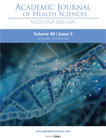|
Abstract:
|
[eng] Introduction: asthma is the most common chronic disease among children. The cases of asthma are increasing dramatically. Families play an important role in childhood asthma management. Children with chronic diseases and their mothers show stress and anxiety incidences, which are supported by publications. The main purpose of this study was to understand parental stress and associated coping behaviors of mothers of children with asthma. To the best of our knowledge, this is the first study conducted in this field. Materials and method: our study was conducted prospectively, and we included 75 asthmatic children and their mothers as study group. In the control group, 60 healthy children and their mothers were included. Data was collected by the researchers using the Clinical Interview form, the Beck Anxiety Scale and Coping with Stress Scale of Style. Results: a total of 135 patients (75 patients, 60 control groups) were included in the study. There was no significant difference between the groups in terms of the age of the participants and the age of the mothers. When compared in terms of asthma diagnosis during pregnancy, the mothers in the study group had a statistically significant higher history of asthma during pregnancy (p<0.05), but the mothers were similar in terms of smoking. When the mean anxiety scores of the mothers were compared with the duration of asthma of the child in the study group, it was observed that the mean anxiety scores of the mothers increased as the duration of asthma increased, but there was no statistically significant difference, whereas when the anxiety scores of the mothers were compared between the groups, it was observed that the level of severe anxiety was statistically significantly higher in the study group.In the mothers of children with asthma, optimistic attitudes and self-confident approach, compared to healthy children of mothers who had low scores and were found to be statistically significantly different. Conclusions: this study revealed that asthmatic children’s mothers’ stress and anxiety levels increased. It has been determined that during the follow-ups and treatments of children with asthma, giving support to families will help and improve both the patients’ treatment process and the dialog between doctors and patients’ relatives. ; [spa] dramática. Las familias desempeñan un papel importante en el manejo del asma infantil. Los niños con enfermedades crónicas y sus madres presentan niveles de estrés y ansiedad, tal como lo respaldan diversas publicaciones. El objetivo principal de este estudio fue comprender el estrés parental y los comportamientos de afrontamiento asociados en madres de niños con asma. Hasta donde sabemos, este es el primer estudio realizado en este campo. Materiales y método: nuestro estudio se realizó de forma prospectiva e incluyó a 75 niños asmáticos y sus madres como grupo de estudio. En el grupo control se incluyeron 60 niños sanos y sus madres. Los datos fueron recolectados por los investigadores mediante el Formulario de Entrevista Clínica, la Escala de Ansiedad de Beck y la Escala de Estilos de Afrontamiento del Estrés. Resultados: se incluyó un total de 135 participantes (75 en el grupo de estudio y 60 en el grupo control). No se encontró una diferencia significativa entre los grupos en cuanto a la edad de los participantes ni a la edad de las madres. Al comparar los antecedentes de diagnóstico de asma durante el embarazo, se observó que las madres del grupo de estudio tenían un historial de asma durante el embarazo significativamente mayor (p<0,05), aunque eran similares en cuanto al hábito de fumar. Cuando se compararon las puntuaciones medias de ansiedad de las madres con la duración del asma en el niño dentro del grupo de estudio, se observó que las puntuaciones medias de ansiedad aumentaban conforme aumentaba la duración del asma, aunque esta diferencia no fue estadísticamente significativa. Sin embargo, al comparar las puntuaciones de ansiedad de las madres entre los grupos, se encontró que el nivel de ansiedad severa fue significativamente mayor en el grupo de estudio. En las madres de niños con asma, se observaron actitudes optimistas y enfoques autoconfiados más bajos en comparación con las madres de niños sanos, siendo esta diferencia estadísticamente significativa. Conclusiones: este estudio reveló que los niveles de estrés y ansiedad en las madres de niños asmáticos estaban aumentados. Se determinó que brindar apoyo a las familias durante el seguimiento y tratamiento de los niños con asma contribuirá a mejorar tanto el proceso terapéutico de los pacientes como el diálogo entre los médicos y los familiares de los pacientes. |

 The evaluation of anxiety levels and methods of coping with stress in mothers of children with asthma
The evaluation of anxiety levels and methods of coping with stress in mothers of children with asthma